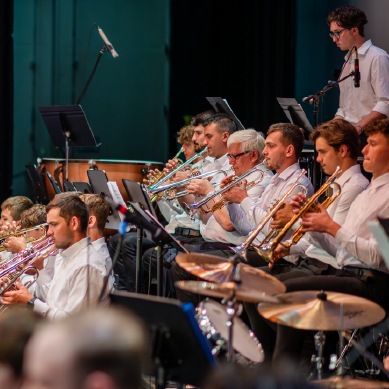You are invited
Experience the wonder of Christmas
through music.
Join us for a two-hour symphonic journey
that tells the real Christmas story - woven
together with timeless classics, modern
interpretations, and fresh new works.
Let the orchestra surround you with a
spirit of joy, reflection, and celebration,
capturing what Christmas is truly about.
December 6th - 5 pm
Bethany Church
2603 Brookdale Dr, Brooklyn Park
You are invited
Experience the wonder of Christmas
through music.
Join us for a two-hour symphonic journey
that tells the real Christmas story - woven
together with timeless classics, modern
interpretations, and fresh new works.
Let the orchestra surround you with a
spirit of joy, reflection, and celebration,
capturing what Christmas is truly about.
December 6th - 5 pm
Bethany Church
2603 Brookdale Dr, Brooklyn Park





- 00Days
- 00Hours
- 00Minutes
It’s okay to ask
We know it’s not always easy to reach out - but we’re here for you. Ask us anything about church, faith, what we believe, or even just life. And if you’re not sure what to ask, that’s okay too -
we’re glad to simply listen.
FAQ
Why do christians celebrate Christmas?
Christians around the world celebrate Christmas because it marks a crucial turning point in human history. Through Jesus’ birth, humanity was given the chance to solve what was once impossible — to overcome the problem of sin. It is the moment when God began His plan of salvation, which starts with sending His beloved Son, Jesus Christ. Christmas is thus a time of deep gratitude and joy. Christians celebrate not only Jesus’ birth but also the start of God’s redemptive plan for all people.
Why is the birth of Jesus considered a divine event?
The birth of Jesus marks the moment when God Himself entered human history in human form. Jesus was not an ordinary child; He was the Son of God, conceived miraculously by the Holy Spirit and born of the Virgin Mary. This miraculous conception shows God’s direct involvement and power in bringing salvation to the world.
The Holy Spirit’s role in Jesus’ birth highlights the miraculous and divine nature of this event. Scripture tells us that Mary conceived Jesus “through the Holy Spirit” (Luke 1:35), without any human intervention. This means that Jesus’ life began as a divine act, not a natural one, emphasizing that He is fully God and fully human.
Why is the virgin birth so important?
The virgin birth of Jesus is a central and miraculous truth in Christianity, and it holds deep spiritual and theological significance. According to Scripture, Mary conceived Jesus through the Holy Spirit while remaining a virgin (Luke 1:26–35). This extraordinary event shows that Jesus’ birth was entirely the work of God, not the result of human effort, highlighting His divine nature.
Salvation requires a perfect, sinless sacrifice — someone who is fully human to represent humanity and fully God to bear the infinite penalty for sin. Because of His divinity, Jesus lived a holy, sinless life and had the authority to forgive sins. The virgin birth ensured that He entered the world without inheriting original sin, making Him the spotless Lamb of God.
Is there any historical evidence about Jesus' birth?
Historical References to Jesus:
Flavius Josephus, a first-century Jewish historian, mentions Jesus in his work Antiquities of the Jews, referring to Him as a wise man and noting the execution of James, “the brother of Jesus, who was called Christ.”
Publius Cornelius Tacitus, a Roman historian, writes in his Annals about Jesus’ execution under Pontius Pilate during Emperor Tiberius’s reign.
Suetonius, another Roman historian, refers to disturbances caused by followers of “Chrestus,” believed to be a misspelling of Christ.
Celsus, a second-century critic of Christianity, acknowledges Jesus’ existence and mentions aspects of His life.
The Babylonian Talmud, a central text of Rabbinic Judaism, contains references to Jesus, His crucifixion, and His disciples.
Archaeological Evidence:
The Res Gestae Divi Augusti, an inscription detailing the achievements of Emperor Augustus, includes a decree for a census, aligning with the biblical account in Luke 2:1.
An inscription found in Beirut mentions Quirinius, the Roman governor of Syria, conducting a census, supporting the biblical narrative of the census during Jesus’ birth.
Papyrus Oxyrhynchus 405, dating to the third century, references early Christian writings about the virgin birth, indicating belief in this event within a century of Jesus’ life.
Conclusion:
The article concludes that, despite some uncertainties about exact dates and locations, the combined historical and archaeological evidence supports the biblical account of Jesus’ birth. The consistency of these sources across different disciplines strengthens the case for the historical reality of Jesus’ life and birth.
For a more detailed exploration, you can read the full article here: Does Archaeology Support the Historical Birth of Jesus?.
Does Christmas have any connection with the Old Testament?
Christmas is deeply connected to the Old Testament, as the birth of Jesus fulfills many prophecies and promises given hundreds of years earlier. The entire story of Christmas is rooted in God’s plan for salvation that began long before Jesus was born.
Prophecy of the Messiah:
Isaiah 7:14 says, “The virgin shall conceive and bear a son, and shall call his name Immanuel” — meaning “God with us.”
Micah 5:2 says, “But you, Bethlehem Ephrathah, though you are small among the clans of Judah, out of you will come for me one who will be ruler over Israel, whose origins are from of old, from ancient times.”
God’s covenant promises:
Genesis 12:3 says, “I will bless those who bless you, and whoever curses you I will curse; and all peoples on earth will be blessed through you.”
2 Samuel 7:12 says, “When your days are over and you rest with your ancestors, I will raise up your offspring to succeed you, your own flesh and blood, and I will establish his kingdom.
Foreshadowing of salvation:
John 8:12 says, “When Jesus spoke again to the people, he said, “I am the light of the world. Whoever follows me will never walk in darkness, but will have the light of life.”
God spoke many times throughout the Old Testament about Jesus coming begging with Genesis, then Moses, prophets, and John the Baptist. WIth the birth of Jesus Christ, may old testament prophecies were fulfilled including the “Emmanuel – God is with us”.
What are the extraordinary things that took place during Jesus’ birth?
The birth of Jesus was marked by many extraordinary and miraculous events that highlight its divine nature and God’s plan for salvation:
The virgin birth.
Angelic announcements.
The journey to Bethlehem and humble birth.
The visit of the shepherds.
The visit of the Magi and the guiding star.
Fulfillment of prophecy.
Together, these extraordinary events highlight that Jesus’ birth was not an ordinary event — it was a divine intervention in human history, marking the beginning of God’s plan of salvation and bringing hope, light, and peace to the world.
Why was Jesus born in a manger?
Jesus was born in a manger, a simple feeding trough for animals, because there was no room in the inn for Mary and Joseph when they arrived in Bethlehem (Luke 2:7). This humble setting holds deep spiritual significance:
A sign of humility
Identification with humanity
Fulfillment of God’s plan
A lesson in God’s values.
Jesus was born in a manger to show that God’s greatest gifts come in humble forms, that He identifies with humanity, and that His kingdom is not about earthly wealth or power, but about love, grace, and redemption.
Copyright ©2016 Bethany Slavic Baptist Church. All rights Reserved.

